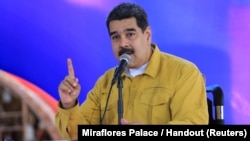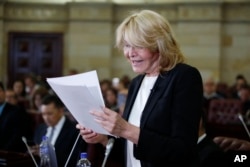Venezuela's opposition-controlled but essentially powerless congress gave a group of self-exiled judges permission Tuesday to put President Nicolas Maduro on trial for allegedly seeking bribes from Odebrecht, the Brazilian construction giant at the center of a regional corruption scandal.
Maduro's trial will only be symbolic, as the jurists who are overseeing the case are not recognized by Venezuela's law enforcement institutions.
The proceedings against Maduro started earlier this month in Bogota, Colombia, where a group of judges known as Venezuela's "Supreme Court in Exile" met to review claims that Maduro illegally sought $50 million from Odebrecht for his 2013 presidential campaign.
At the highly publicized hearing, Venezuela's deposed chief prosecutor, Luisa Ortega, claimed that Maduro sought $50 million from the Brazilian construction company for his 2013 presidential campaign and in exchange offered to help Odebrecht secure new contracts. Ortega asked for Maduro to be tried for corruption and money laundering and handed the judges a CD with evidence of his alleged crimes.
On Tuesday, the National Assembly, which was largely superseded by a pro-government constituent assembly installed last summer, voted overwhelmingly to approve a request by the jurists to proceed to a trial.
Officials of Maduro's socialist government have called the jurists' proceedings "silly" and "illegal."
A webcast set up by the National Assembly showed representatives cheering and chanting "liberty" as voting results were announced. Local media were not allowed to broadcast the assembly's proceedings, and journalists were stopped from entering the chamber by Venezuela's National Guard, which has a long history of censoring the local press.
The "Supreme Court in Exile" is made up of thirty jurists who were appointed to Venezuela's highest court by the National Assembly last year. They fled the country after Maduro threatened to imprison them, accusing them of trying to illegally replace Venezuela's government-stacked supreme court.
Opponents of Maduro hope the symbolic trial will raise awareness about the president's alleged crimes.
"This man's corruption is drowning us," said Juan Guaido, one of the congressmen who voted to hold the trial. Guaido argued that Maduro has to be tried outside Venezuela because the country is governed by "a dictatorship."
Tarek William Saab, Venezuela's current chief prosecutor who is a staunch ally of the government, said Monday that the National Assembly's proceedings against Maduro were illegal and irrelevant.





